
We've taken you on several tours of autojumbles in the Netherlands, but there can also be plenty of cyclemotor, autocycle and moped interest at UK events; take the VMCC Founder's Day rally for example...
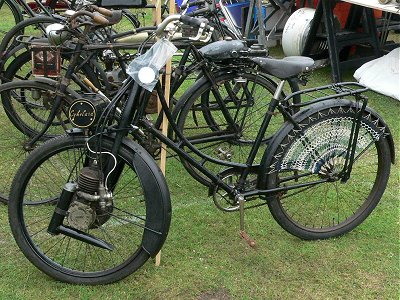 Peter Smith's stand (Smiths Autocycles) was the first to grab our
attention as we went through the entrance gate. This
Sheppee Cykelaid was the first in a line-up of interesting
machines.
Peter Smith's stand (Smiths Autocycles) was the first to grab our
attention as we went through the entrance gate. This
Sheppee Cykelaid was the first in a line-up of interesting
machines.
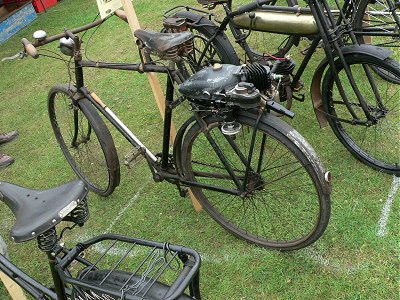 Next to the Cykelaid was
something even rarer: a Rosengart cyclemotor. Introduced in
1923 the Moteurcycle L Rosengart
was made in Paris. Its 90cc two-stroke engine
drives a pair of contra-rotating rollers that grip the edges of
the cycle wheel rim.
Next to the Cykelaid was
something even rarer: a Rosengart cyclemotor. Introduced in
1923 the Moteurcycle L Rosengart
was made in Paris. Its 90cc two-stroke engine
drives a pair of contra-rotating rollers that grip the edges of
the cycle wheel rim.
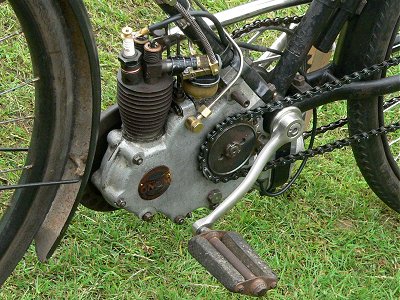 Another machine from the early 1920s was this
63cc Gnom
bicycle engine mounted on a Torpedo cycle.
Another machine from the early 1920s was this
63cc Gnom
bicycle engine mounted on a Torpedo cycle.
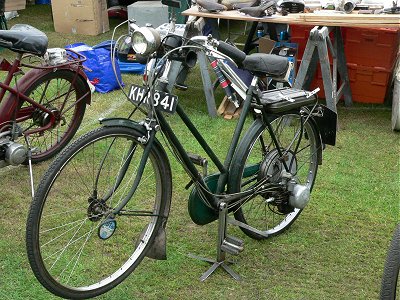 Now something a bit more familiar: A
BSA Winged Wheel in a Raleigh
cycle.
Now something a bit more familiar: A
BSA Winged Wheel in a Raleigh
cycle.
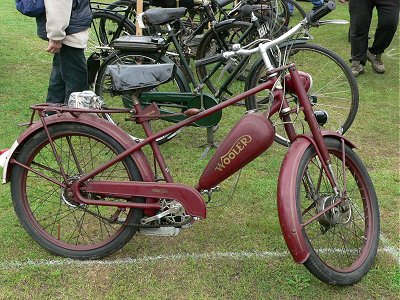 Returning to the unusual, but staying in the 1950s,
is this Wooler 160 Special
moped from Denmark.
Returning to the unusual, but staying in the 1950s,
is this Wooler 160 Special
moped from Denmark.
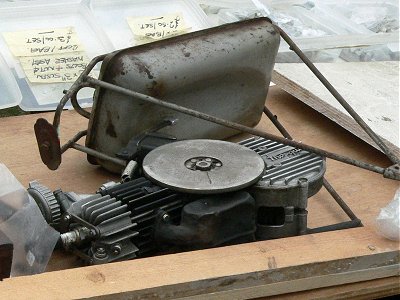 As well as the complete machines, Peter had som
interesting bits & pieces too. Here's a Mosquito engine
complete with tank.
As well as the complete machines, Peter had som
interesting bits & pieces too. Here's a Mosquito engine
complete with tank.
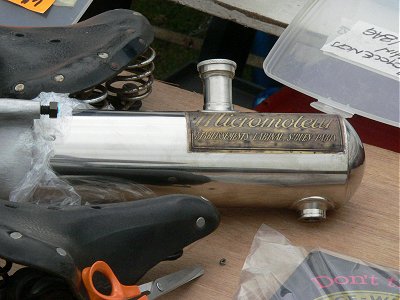 This fuel tank is for a Micromoteur.
This fuel tank is for a Micromoteur.
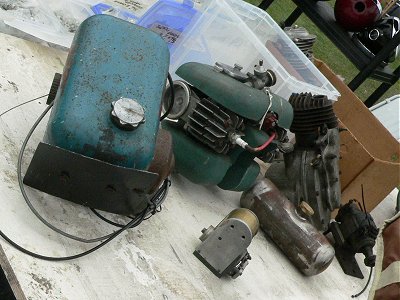 A Mini-Motor, a Mepps
Baby Star and the engine from a Cyclotracteur
A Mini-Motor, a Mepps
Baby Star and the engine from a Cyclotracteur
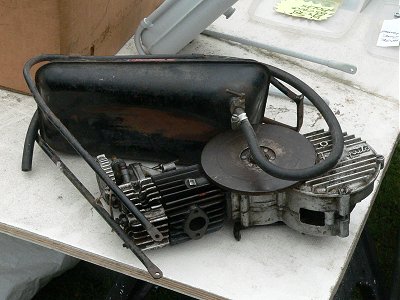 Another Mosquito engine, again complete with its
tank.
Another Mosquito engine, again complete with its
tank.
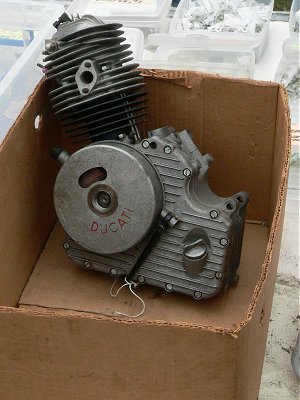 And, sitting in a cardboard box, a Ducati
Cucciolo.
And, sitting in a cardboard box, a Ducati
Cucciolo.
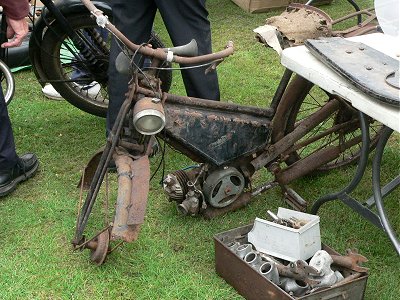 All that - and we've
only looked at one stall so far ... time to move on. On a
stall a little further down, we spotted this Francis Barnett
Powerbike. The lack of a front rim makes it appear a bit of
a sad case but, in fact, most of the rest of it is there.
All that - and we've
only looked at one stall so far ... time to move on. On a
stall a little further down, we spotted this Francis Barnett
Powerbike. The lack of a front rim makes it appear a bit of
a sad case but, in fact, most of the rest of it is there.
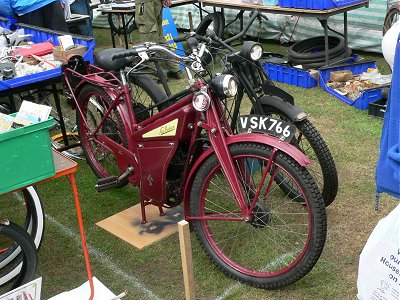 We didn't have to go far to find another
Francis Barnett Powerbike, a Model 56 this time. In front
of it is a New Hudson autocycle and they're both on Pete
Stratford's Cyclemotor and Autocycle
Spares stall.
We didn't have to go far to find another
Francis Barnett Powerbike, a Model 56 this time. In front
of it is a New Hudson autocycle and they're both on Pete
Stratford's Cyclemotor and Autocycle
Spares stall.
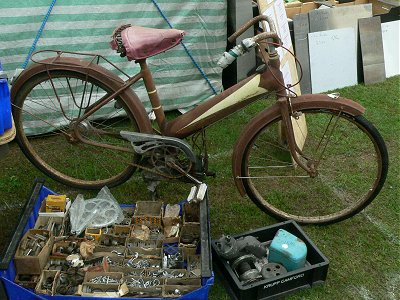 At present, there seems to be
quite a bit of interest in the purpose-built frames for Mosquito
cyclemotors. Pete Stratford had this nice example of the
genre. That looks like most of a GYS - or is it a Cairns? - in the box on the
ground.
At present, there seems to be
quite a bit of interest in the purpose-built frames for Mosquito
cyclemotors. Pete Stratford had this nice example of the
genre. That looks like most of a GYS - or is it a Cairns? - in the box on the
ground.
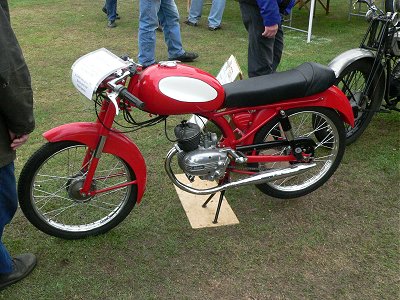 Moving
on again, we find this Itom Astor - which could be yours if
you've £2,000 to spare.
Moving
on again, we find this Itom Astor - which could be yours if
you've £2,000 to spare.
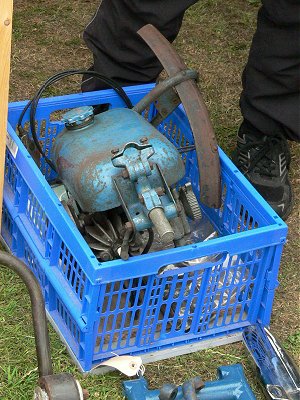 Sitting
in a plastic crate is a Mini-Motor. It's complete with the
hoop and the mounting brackets.
Sitting
in a plastic crate is a Mini-Motor. It's complete with the
hoop and the mounting brackets.
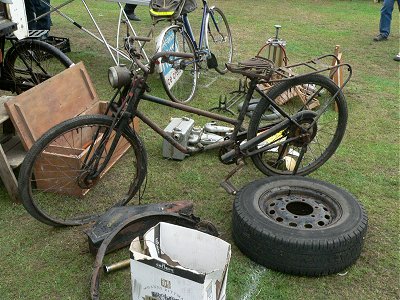 Tony Cardy always has
some interesting items - this Francis Barnett Powerbike is the
third we've seen so far today. Eagle-eyed cycle enthusiasts
will have spotted the Bates bicycle in the background from its
Diadrant fork.
Tony Cardy always has
some interesting items - this Francis Barnett Powerbike is the
third we've seen so far today. Eagle-eyed cycle enthusiasts
will have spotted the Bates bicycle in the background from its
Diadrant fork.
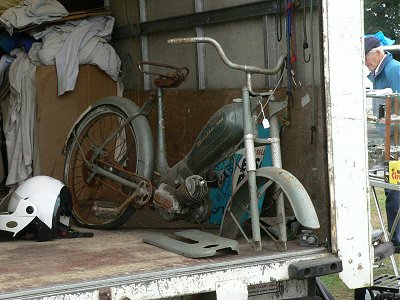 Tony had a couple of mopeds still in the back of his
van - this Berini Pluvier 210 was
one...
Tony had a couple of mopeds still in the back of his
van - this Berini Pluvier 210 was
one...
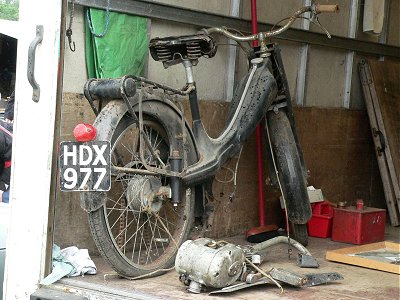 ... and the other was this Norman Nippy.
... and the other was this Norman Nippy.
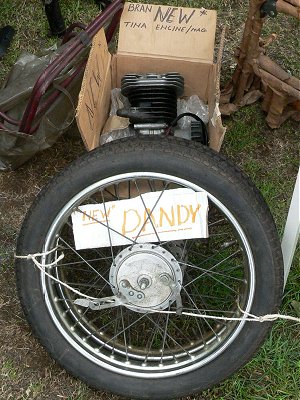 Moving on again we
find a BSA Dandy wheel and, behind it,
a brand new engine. The label says it's for a Triumph Tina
but actually it's for the later version, the T10; at £150, it didn't stay there for
long.
Moving on again we
find a BSA Dandy wheel and, behind it,
a brand new engine. The label says it's for a Triumph Tina
but actually it's for the later version, the T10; at £150, it didn't stay there for
long.
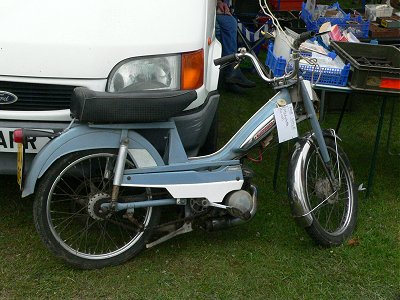 Here's a
Mobylette in good order and complete with V5C.
Here's a
Mobylette in good order and complete with V5C.
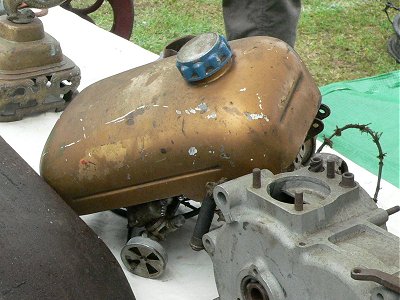
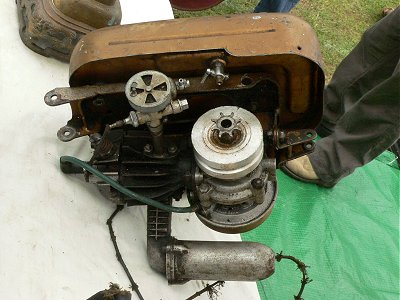 Another Mini-Motor, this one is the Mark
Five version, probably the least common of the various
versions. It's probably been used for something other than
driving a cycle in its latter years if the pulley and sprocket
are anything to go by.
Another Mini-Motor, this one is the Mark
Five version, probably the least common of the various
versions. It's probably been used for something other than
driving a cycle in its latter years if the pulley and sprocket
are anything to go by.
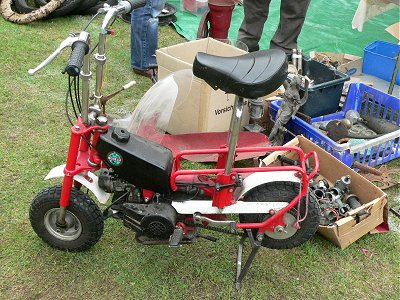 A little
Benelli. The seat, handlebars and footrests fold up so it
will fit in a car boot.
A little
Benelli. The seat, handlebars and footrests fold up so it
will fit in a car boot.
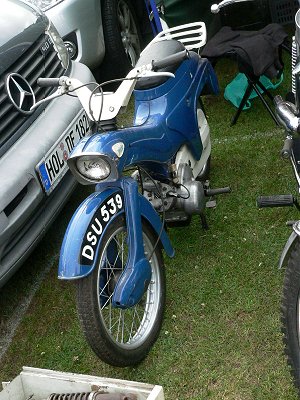 This Ariel Pixie was among some bigger bikes.
The price on the headlamp is £650.
This Ariel Pixie was among some bigger bikes.
The price on the headlamp is £650.
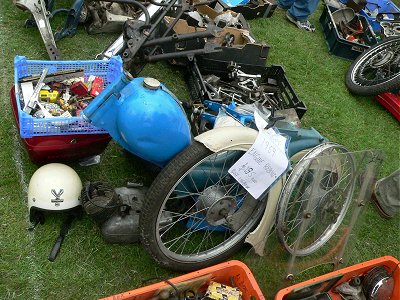 Another stall had a few
machines in kit form. Buy these bits for £195, put
them together and they become a Zündapp Combinette.
Another stall had a few
machines in kit form. Buy these bits for £195, put
them together and they become a Zündapp Combinette.
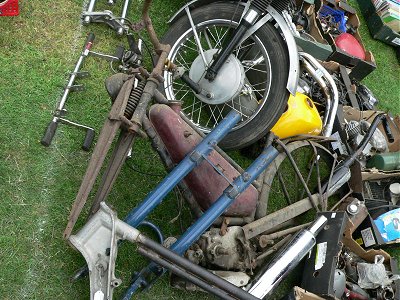 Here's a substantial chunk of Norman Motobyk
Here's a substantial chunk of Norman Motobyk
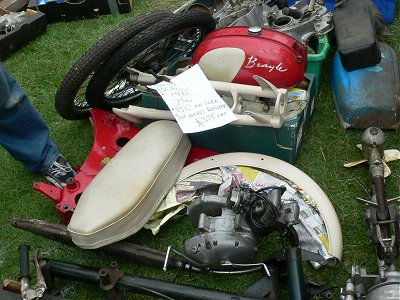 And
another kit form machine: a BSA
Beagle. This was priced at £375 and had a V5c.
And
another kit form machine: a BSA
Beagle. This was priced at £375 and had a V5c.
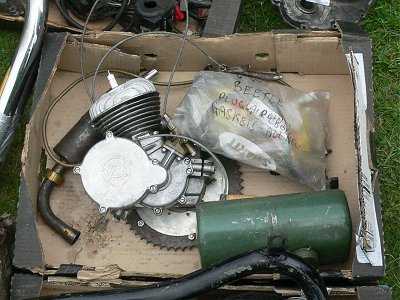 The "KO" on the casting
stands for Krasnõi Oktjabr - Red October. This is a
Russian cyclemotor engine.
The "KO" on the casting
stands for Krasnõi Oktjabr - Red October. This is a
Russian cyclemotor engine.
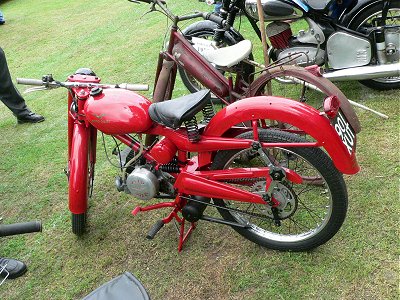 Colin Kirsch (BuyVintage) had a stall in the corner of the
autojumble area. This Moto Guzzi Cardellino was among his
selection on machines.
Colin Kirsch (BuyVintage) had a stall in the corner of the
autojumble area. This Moto Guzzi Cardellino was among his
selection on machines.
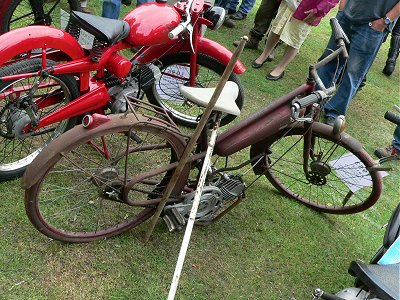 The Cucciolo on this bike
is one of the engines built in France by M Rochet and the
frame is an Eriac. Eriac specialised in cyclos sportives. Maigret fans
may be interested to know that Eraic had premises in the
boulevard
Richard-Lenoir.
The Cucciolo on this bike
is one of the engines built in France by M Rochet and the
frame is an Eriac. Eriac specialised in cyclos sportives. Maigret fans
may be interested to know that Eraic had premises in the
boulevard
Richard-Lenoir.
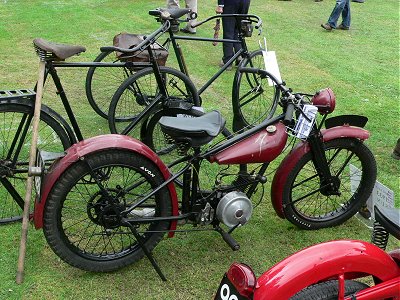 This little Sun motor cycle dates from 1929.
This little Sun motor cycle dates from 1929.
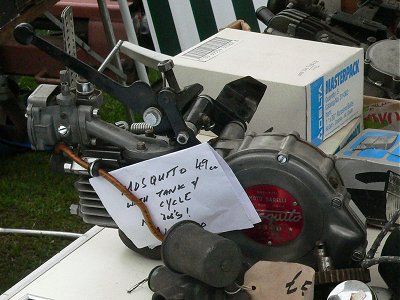 There were still more cyclemotors scattered around
the jumble stall - like this Mosquito 38B
There were still more cyclemotors scattered around
the jumble stall - like this Mosquito 38B
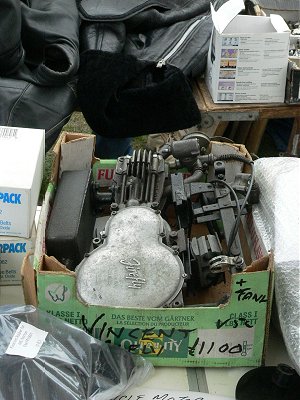 The silencer on this Vincent Firefly looks
home-made, but the rest of it is all there (including the tank,
cycle and V5c). The asking price of £1,100 shows the
effect of the word "Vincent" on prices.
The silencer on this Vincent Firefly looks
home-made, but the rest of it is all there (including the tank,
cycle and V5c). The asking price of £1,100 shows the
effect of the word "Vincent" on prices.
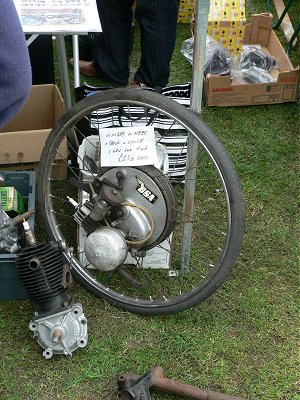 A BSA Winged
Wheel for £250. Again, the tank and cycle were
available and it also had a logbook.
A BSA Winged
Wheel for £250. Again, the tank and cycle were
available and it also had a logbook.
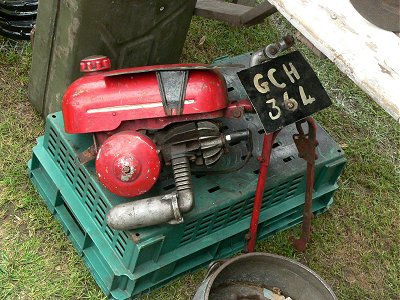 Another Mark 5 Trojan Mini-Motor - this
one is complete with its hoop and mounting brackets.
Another Mark 5 Trojan Mini-Motor - this
one is complete with its hoop and mounting brackets.
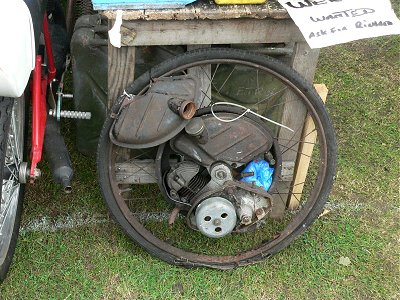 A
Cyclemaster wheel, this is the 25cc version
A
Cyclemaster wheel, this is the 25cc version
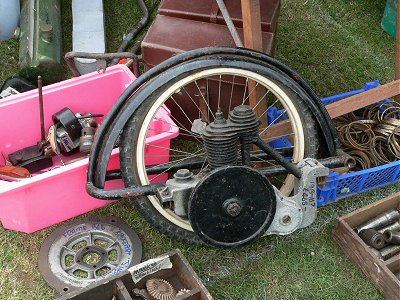 This Wall Auto Wheel had a price tag of
£465...
This Wall Auto Wheel had a price tag of
£465...
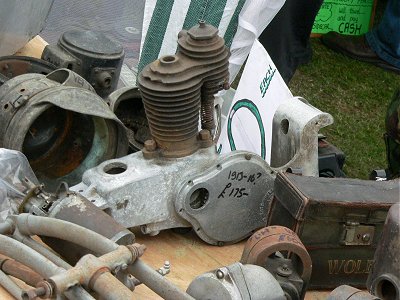 ... or £175 for the remains
of an engine unit.
... or £175 for the remains
of an engine unit.
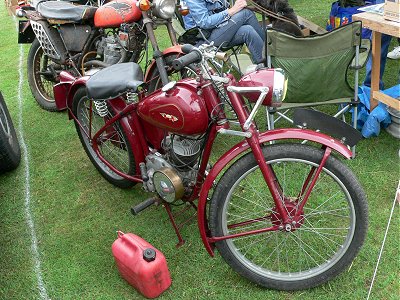 James Comet motor cycle.
James Comet motor cycle.
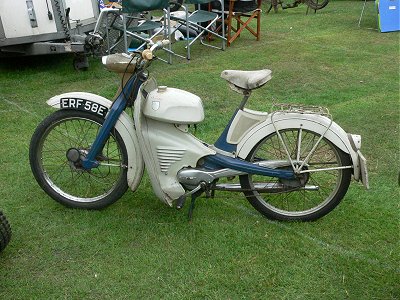 A
NSU Quickly dating from 1966.
A
NSU Quickly dating from 1966.
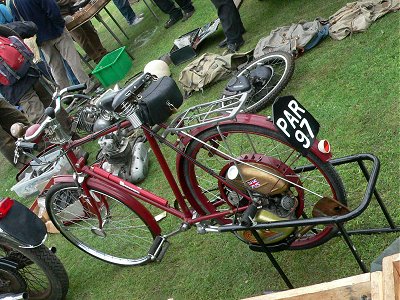 We
presume that the idea of the unusual exhaust system on this
Cyclemaster is to prevent the problem of the rim (and rear brake)
getting covered in oil.
We
presume that the idea of the unusual exhaust system on this
Cyclemaster is to prevent the problem of the rim (and rear brake)
getting covered in oil.
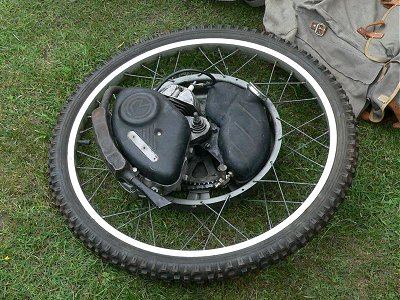 This Cyclemaster wheel has been rebuilt into a
modern Mountain Bike wheel rim.
This Cyclemaster wheel has been rebuilt into a
modern Mountain Bike wheel rim.
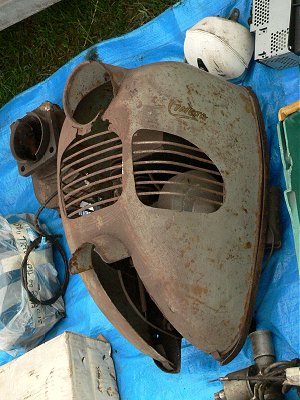 A
Cymota. the cowling has rusted though in one spot - but
that's a lot better than not having a cowling at all.
Asking price? £350.
A
Cymota. the cowling has rusted though in one spot - but
that's a lot better than not having a cowling at all.
Asking price? £350.
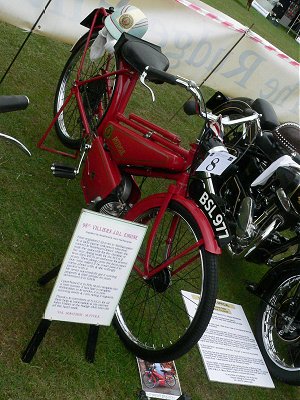 That's it for the jumble. The event also has a
number of exhibition stands set up by both VMCC sections and independent clubs. The
Rudge Enthusiasts had a lerge display and Val Sowerby's Rudge
autocycle was among the machines on display. This actual
machine was the subject of Mark Daniels's article The
Last Record.
That's it for the jumble. The event also has a
number of exhibition stands set up by both VMCC sections and independent clubs. The
Rudge Enthusiasts had a lerge display and Val Sowerby's Rudge
autocycle was among the machines on display. This actual
machine was the subject of Mark Daniels's article The
Last Record.
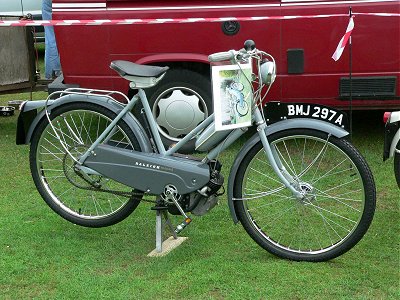 Harvey Spencer was exhibiting some of his
restorations. Among them were two Raleigh mopeds: this
RM1...
Harvey Spencer was exhibiting some of his
restorations. Among them were two Raleigh mopeds: this
RM1...
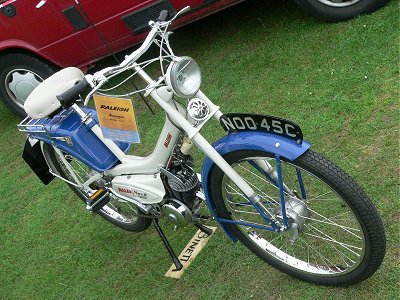 ...and this RM8 Automatic
Mark 2.
...and this RM8 Automatic
Mark 2.
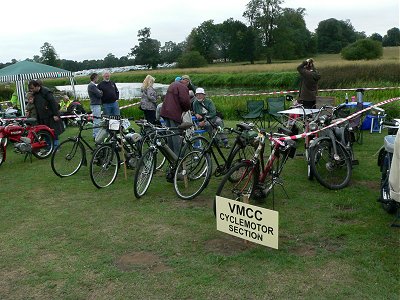 Finally, the obvious place to go to see cyclemotors
at this event is the stand of the VMCC Cyclemotor Section. They had a busy
stand with several machines on display. Let's take a look
at a few of the machines they were exhibiting...
Finally, the obvious place to go to see cyclemotors
at this event is the stand of the VMCC Cyclemotor Section. They had a busy
stand with several machines on display. Let's take a look
at a few of the machines they were exhibiting...
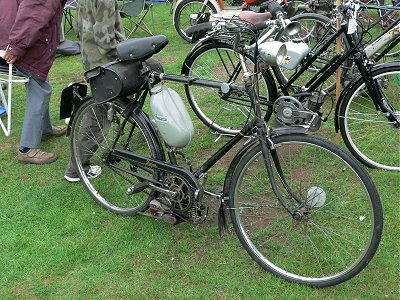 We've seen several Mosquitos
already and here's another. It's on a BSA-built Sunbeam cycle with, apart from the saddle,
all the corrct period fittings: BSA brakes,
BSA 3-speed hub gear, Sunbeam
chainwheel...
We've seen several Mosquitos
already and here's another. It's on a BSA-built Sunbeam cycle with, apart from the saddle,
all the corrct period fittings: BSA brakes,
BSA 3-speed hub gear, Sunbeam
chainwheel...
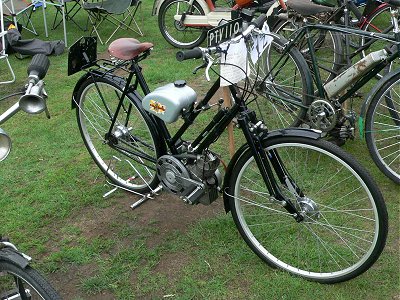 This
Cucciolo probably pre-dates its 1953 registration. We can
get a bit confused about the various models of Cucciolo, however,
we think that the rearward facing exhaust outlet and the
smooth-sided (rather than ribbed) crankcase castings, along with
several other differences, mean this is is one of the SIATA
ones. The cycle is a Raleigh that's been fitted with a Webb
cyclemotor spring fork. Note also that it's driving through
a Sturmey-Archer AB hub; with a
two-speed engine unit, that gives a total of six gears ... but no
engine braking.
This
Cucciolo probably pre-dates its 1953 registration. We can
get a bit confused about the various models of Cucciolo, however,
we think that the rearward facing exhaust outlet and the
smooth-sided (rather than ribbed) crankcase castings, along with
several other differences, mean this is is one of the SIATA
ones. The cycle is a Raleigh that's been fitted with a Webb
cyclemotor spring fork. Note also that it's driving through
a Sturmey-Archer AB hub; with a
two-speed engine unit, that gives a total of six gears ... but no
engine braking.
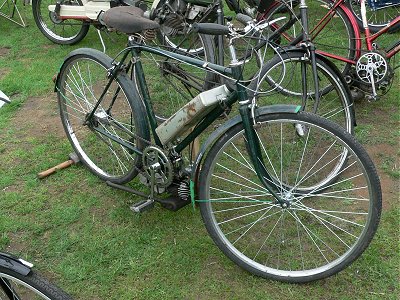 A Vincent Firefly. This is a later version
than the one we saw in the jumble.
A Vincent Firefly. This is a later version
than the one we saw in the jumble.
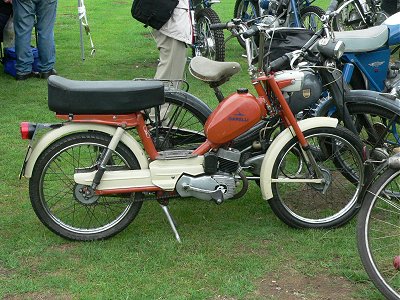 Cyclemotors took pride of place on the stand, but
there were mopeds too. Peter Lawson had brought his Post
Office Puch along and, in the second row behind the cyclemotors,
were these two: a Garelli and an NSU
Quickly.
Cyclemotors took pride of place on the stand, but
there were mopeds too. Peter Lawson had brought his Post
Office Puch along and, in the second row behind the cyclemotors,
were these two: a Garelli and an NSU
Quickly.
| CAMmag Home Page | List of articles | List of events |